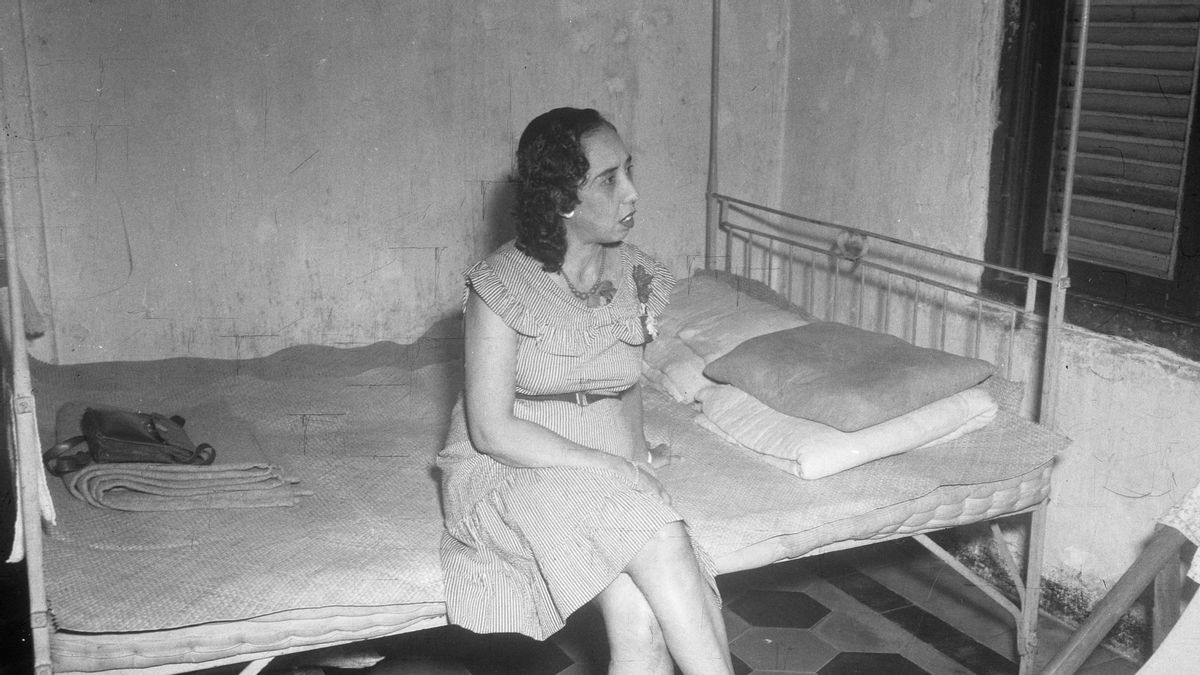JAKARTA - Lustful business practices mushroomed after a few years Jayakarta was conquered by the Dutch trading company, the VOC and turned it into Batavia in 1619. There was an attempt by the colonial government to stem the business in the era of Governor General Jan Pieterszoon Coen. But those efforts were in vain.
The imbalance of the population between European men and women in the archipelago was the main cause of the spread of the sex business in the Dutch East Indies. For a rich Dutchman, it was easy to bring a wife to the colonies. Different conditions with totok whose economy is mediocre. They only have two choices: keep a mistress or visit a brothel.
In the notes of the Dutch historian, Leonard Blusse, he noted that seven years after Batavia was founded - precisely in 1625 - brothels flourished. The reason is none other than because the city of Batavia has become a "rendezvous" (dating) place for foreign sailors.
"So that brothels flourished in Batavia, which was located in front of the fort in the Fish Market area," said Leonard Blusse in the book The Strange Alliance: Chinese Settlers, Peranakan and Dutch Women in Batavia VOC (1988).
This suddenly made the Governor-General of the VOC who had served twice (1619-1623 and 1627-1629), Jan Pieterszoon Coen. Coen, who was known as a fanatic Calvinist, began to work on stopping the practice of adultery, concubinage, and prostitution. Regarding prostitution in Batavia, we have also reviewed it in full in the article "Lonteku di Batavia".
Coen has a mission to remove those three things from Batavia. That wish Coen expressed in several letters to the VOC official, Heeren Zeventien in the Netherlands. According to him, this immoral practice would only result in negative things, such as abortion, infanticide, and sometimes poisoning his husband by jealous mistresses.
Moreover, from concubinage, said Coen, it will only give birth to illegitimate children who are not necessarily recognized. As proof of his assertiveness in fighting the moral disease of the Dutch in the land of the Colonies, his adopted daughter, Sara Specx, became a victim. Sara, who was known to have committed adultery with a lowly soldier, Pieter Cortenhoeff was taken firmly. In full, we have reviewed the problem of the scandal in the article "The Beheaded Head and the Tragedy of Love Behind the Term Masherhead."
“In fact, prostitution is a problem that the city is facing. In fact, the number one person in Batavia once punished his adopted daughter, Sara, who was caught 'making out' with a young VOC officer at his residence (Kasteel Batavia). The officer was beheaded, while the girl was flogged half naked. The executions were carried out at City Hall (now the Jakarta History Museum, JI Falatehan, West Jakarta), "wrote Alwi Shahab in the book Batavia: Queen of The East (2002).

Although Coen's efforts have not been fruitful, efforts to reduce the prostitution business have continued during the reigns of other Gurbernur General. For this reason, in 1642 issued a regulation prohibiting every Christian family from employing native women as domestic servants and prohibiting everyone from inviting good women to commit adultery. However, this regulation does not explain who is meant by the 'good woman'.
As a result, after the regulation was implemented, many Europeans and Asians were convicted by the courts for perpetuating prostitution and adultery. Quoted from Hendrik E. Niemeijer in the book Batavia: Colonial Society of the XVII Century (2012), he noted that in 1644 it was discovered that one of the Asian women who became pimps of sex workers or prostitutes was convicted by a local court.
"The verdict handed down by the court against the matchmakers was quite light: just two hours standing in the field in front of City Hall with a board tied under his chin stating the crime he had committed and paying a fine of 25 rials," said Dutch historian Hendrik. E. Niemeijer.
That's just the matchmaker penalty. For brothel owners the penalties are even harsher. Sara van Bali, for example, the owner of one of the brothels has experienced this. In 1644 it was recorded that the company employees really liked to come to Sara's brothel to channel biological needs to a sex worker named Madellena. It was so busy that Sara's brothel began to catch on with the local authorities.
"As a result, Sara was sentenced to a women's prison for two years for 'managing a wrestling house' while several of her customers were sentenced to caning behind the City Hall," added Hendrik.
In line with that, the Dutch government also started to establish Vrouwen-Tuchthuis (a women's repair center). Achmad Sunjayadi in the book (Bukan) Tabu di Nusantara (2018), revealed that the orphanage aims to rehabilitate women who work as satisfying the sexual needs of Europeans and protect them from public criticism.

Unfortunately, the Dutch government was not taken seriously. This is because in 1766 the Company issued a regulation that prohibited comfort women from entering the port without permission. In that sense, prostitution was a business that was still tolerated by the Dutch colonial government. presumably, this regulatory framework is the aftermath of policies made in the parent country, the Netherlands.
The regulation, said Achmad Sunjayadi, was introduced by Napoleon, who was then in power in Europe, including the Netherlands. The reason is that many soldiers who are the backbone of the military suffer from venereal diseases which affect their fighting spirit. Like it or not, prostitution is a scapegoat.
"In other words, prostitution is still permitted or legal with certain conditions, among other things that female entertainers must have their health checked regularly. A kind of guarantee for customers not to contract venereal disease. This arrangement of prostitution was known during the French occupation of the Netherlands. when the French left Holland in 1813, this rule also disappeared. However, it is being implemented again in a number of municipalities in the Netherlands, "said Achmad Sunjayadi.
Then since 1874, supervision of prostitution has been handed over to each resident. As a result, in practice prostitution has not changed much. The plus was that only public women (a term at that time) were required to register with the police and be examined by a doctor every week.
Until the end of the Dutch colonial rule in Indonesia, various regulations governing prostitution had been made. Essentially the same, prostitution tends to be recognized as a part of the business running on colony land. The Company only strengthened regulations regarding the health of sex workers. That is why the Company always failed to stop prostitution. However, compared to other business matters, it is this biological matter that seems to have been prepared seriously, both from the existence of a legal umbrella, even from infrastructure.
The English, Chinese, Japanese, Arabic, and French versions are automatically generated by the AI. So there may still be inaccuracies in translating, please always see Indonesian as our main language. (system supported by DigitalSiber.id)













